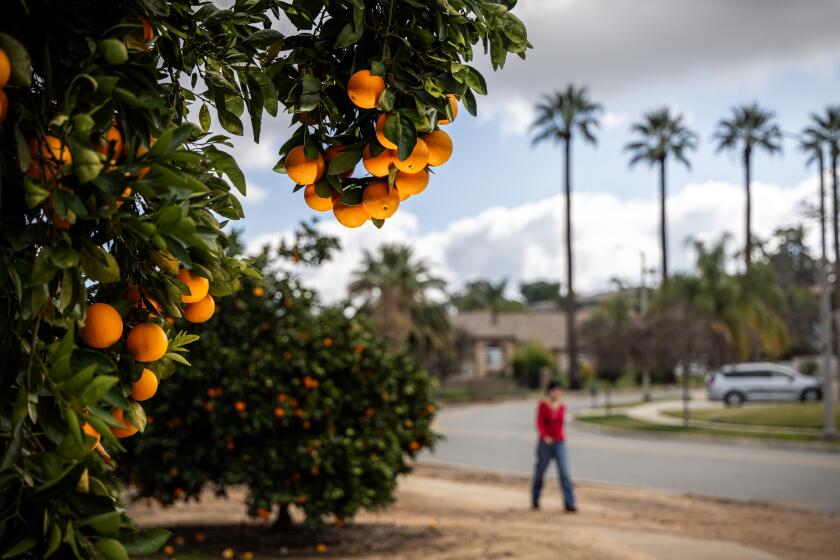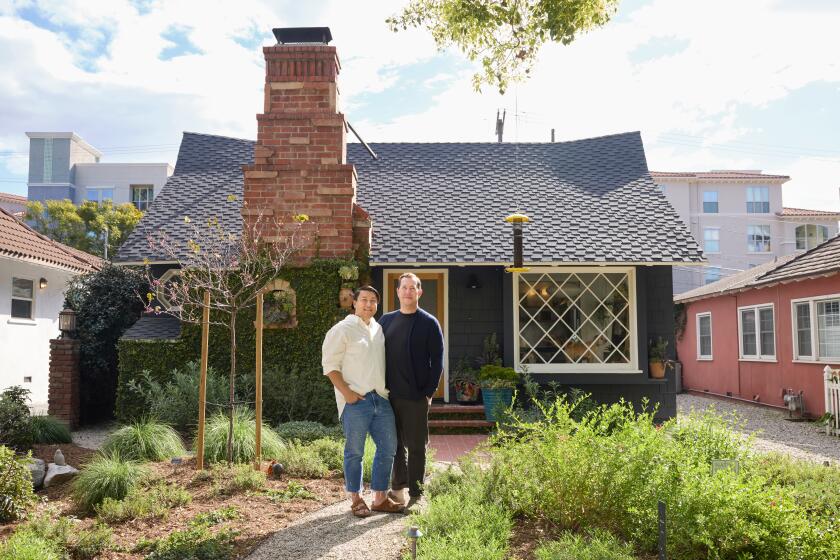Panel Turns Down U.S. Riot Aid Proposal : Recovery: Council members reject $1 million targeted for policing efforts. The move jeopardizes $18 million in other benefits for stricken areas.
Calling President Bush’s key post-riot initiative outdated and divisive, a City Council committee Thursday rejected funding for the anti-crime component of the Weed and Seed program, putting in jeopardy $18 million in social service funding targeted at riot-stricken areas.
In rejecting nearly $1 million in federal funds for a community-based policing plan, the city’s Ad Hoc Recovery Committee cited concerns that the controversial anti-crime, anti-poverty program would intensify tensions in the city.
“My fear is that it will widen the chasm between police and the community--against a backdrop of what can still be described as a volatile situation,” said Councilman Mark Ridley-Thomas, committee chairman, at a public hearing on the program Thursday.
Police officials last month presented a plan to use the $1-million grant for the creation of three mobile substations, bicycle patrols and Spanish-language training for officers among other initiatives in two Weed and Seed designated areas.
But in rejecting the plan, Ridley-Thomas and Councilwoman Rita Walters said they objected to what they called a “stick and carrot” approach of tying the controversial law enforcement aspects of the program, administered by the Justice Department, to social welfare funding.
“In fact . . . the Weed portion of this program has been imposed on communities of color with the purpose of incarceration and not rehabilitation,” said the motion presented by Ridley-Thomas and adopted Thursday.
City Council approval of the ad hoc committee’s action is likely because the subcommittee’s members represent the districts targeted as Weed and Seed areas.
David J. Beightol, executive director of the Presidential Task Force on Los Angeles Recovery, made it clear late Thursday that by rejecting the Weed component, the ad hoc committee was rejecting all $19 million that has been allocated for a variety of social services programs in two areas hit hardest by last spring’s civil unrest.
“If Mark Ridley-Thomas and Rita Walters don’t want the $19 million Weed and Seed money for this community, I’ll recommend to the White House we spend the money in one of the several communities throughout this nation that desperately want the program,” Beightol said.
U.S. Atty. Terree Bowers, who is overseeing the program, said after Thursday’s meeting that the anti-crime and anti-poverty components of the program cannot be severed.
Bowers said he will meet with city and police officials to determine if other law enforcement aspects of the program not dependent on City Council approval would meet Justice Department requirements.
“This is not a stick and carrot approach,” Bowers said. “But it is a comprehensive strategy, a symbiotic relationship in which neither side controls the other.”
Mayor Tom Bradley’s aide Wendy Greuel, who has coordinated the Weed and Seed program for the city, said she is hopeful that all sides can come to an agreement. But she added: “I’m equally concerned that unless we do figure a way for this to work, then the (Justice Department) has the option of rescinding funding.”
Many community and social organizations have begun planning programs, based on approvals they received from the Justice Department, Greuel said.
Federal officials describe Weed and Seed as a two-pronged approach to first weed out gangs and drug dealers from crime-plagued communities and then seed the areas with jobs and social programs--all under the coordination of a task force of federal and local officials and community-based groups.
In some cities that has meant the use of street sweeps, gang tracking and other controversial law enforcement techniques.
However, Los Angeles officials have argued that the Weed efforts here will primarily focus on establishing community-based policing programs.
The City Council in July approved two areas as test sites for the program--a nine-square-mile section of South-Central Los Angeles and 4.5 square miles composed of the Pico-Union and Koreatown neighborhoods.
Despite its rejection of the Weed monies, the ad hoc committee made clear that it supports the concept of community-based policing and suggested that other federal funds might be found to achieve those efforts.
Ridley-Thomas’ motion made three recommendations to the City Council:
* That the city request that the incoming Clinton Administration replace Weed monies with another grant program focused on community-based policing.
* That future community-based policing plans be written in partnership with police and community leadership.
* That the $18 million Seed monies not be “held hostage to the approval of the current Weed proposal.”
City Council approval of the ad hoc committee’s motion would supersede the council’s previous approval of the Weed and Seed program.
Although it has emerged as a key piece of President Bush’s urban agenda in the aftermath of the Los Angeles riots, the program--especially its law enforcement aspects--has been attacked for abusing civil liberties and as creating a double standard of justice for poor communities.
In Los Angeles, the program had been opposed by a broad-based coalition of community groups, including the Southern Christian Leadership Conference, the American Civil Liberties Union and the Coalition for Humane Immigration Rights of Los Angeles.
Eric Mann, director of the Labor/Community Strategy Center, called Thursday’s committee decision a “tremendous victory” that amounted to a “revitalization of what used to be called the civil rights movement” in Los Angeles.
However, police officials said it will only hamper efforts initiated by new Police Chief Willie L. Williams to get community-based policing off the ground.
Cmdr. Maurice Moore said after the hearing: “We will try to respond to the committee’s directive but I don’t see where else we will get the money.”
More to Read
Start your day right
Sign up for Essential California for news, features and recommendations from the L.A. Times and beyond in your inbox six days a week.
You may occasionally receive promotional content from the Los Angeles Times.






